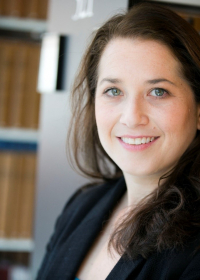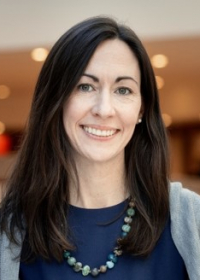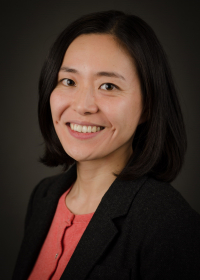By: Rachel Musetti, General Sustainability Intern, Office of Sustainability Initiatives
Each year, Emory’s Office of Sustainability Initiatives (OSI) recognizes March as Climate Awareness Month, in addition to recognizing Women’s History Month. While we work to honor women around the world for their contributions, we are so inspired by our own leaders here at Emory as well. The OSI and Resilience & Sustainability Collaboratory (RSC) team works with three Sustainability Faculty Fellows who conduct critical climate research and prioritize climate action. The following faculty are leaders in the Emory community, and we are so honored to have them on our team.
 Mindy Goldstein, Director of Law and Advocacy, RSC
Mindy Goldstein, Director of Law and Advocacy, RSC
Clinical Professor Mindy Goldstein is the Director of the Turner Environmental Law Clinic and Director of the Environmental and Natural Resources Law Program at Emory Law School. Her work focuses on matters related to sustainable energy and climate change, land use and conservation, sustainable agriculture and urban farming, protection of natural resources, and access to information.
Goldstein is dedicated to helping students conduct work related to climate action. With her guidance, representatives from Emory Law School’s Turner Environmental Law Clinic, Georgia Institute of Technology’s Strategic Energy Institute, and the University of Georgia published the Georgia Model Solar Zoning Ordinance and accompanying explanatory guide to encourage the development of solar energy across the state. The ordinance will help Georgia commit to clean energy while ensuring safe standards for the environment, society, and the economy.
Also under her leadership, Turner Environmental Law Clinic students did a review of research on greenhouse gas emissions and sequestration of farming practices and different crop varieties to advise Emory’s approach to local offset programs. Following her passion for regenerative agriculture and local food systems, Goldstein also represented Emory in the development and negotiation of the partnership with the Conservation Fund’s Working Farms Fund in 2019. This agreement ensures protection of local farmland and the creation of a more resilient food system within the Atlanta region. The partnership is also helping Emory make key progress toward its goal of purchasing 75% local and sustainable foods by 2025.
 Rebecca Philipsborn, Director of Climate, Health Education, and Clinical Partnerships, RSC
Rebecca Philipsborn, Director of Climate, Health Education, and Clinical Partnerships, RSC
Dr. Rebecca Philipsborn is an Assistant Professor of Pediatrics at Emory University School of Medicine, Primary Care Pediatrician at Emory and Children’s Healthcare of Atlanta, and the Director of Climate, Health Education and Clinical Partnerships for Emory’s Resilience and Sustainability Collaboratory (RSC). In research and in medical education, she focuses on the intersection of climate change and health, especially child health, and implications for health equity, clinical practice, and healthcare delivery.
Dr. Philipsborn advocates for a climate curriculum in the medical field. In 2018, she implemented a climate curriculum for Pediatric Global Health Track Residents after participating in Emory’s Piedmont Project faculty development program. When the coronavirus pandemic first began and in-person courses were suspended, Dr. Philipsborn saw the opportunity to once again enhance the medical student experience by creating a virtual elective for third and fourth year students that focused on the health risks resulting from climate change. The resulting Climate Crisis and Clinical Medicine M3 & M4 Virtual Elective covered the topics of climate change and emerging clinical challenges, health equity and social justice, climate solutions for the healthcare sector, and communicating about climate change. The course was open to more than 200 medical students from over 30 institutions across the country.
Following the success of the virtual elective last spring, Philipsborn and other physicians designed a standardized curriculum for teaching climate change to medical students. In the fall, the Association of American Medical Colleges published “Climate Change and the Practice of Medicine: Essentials for Resident Education,” for which Dr. Philipsborn is the lead author. The paper serves as a national guide for educating resident physicians on the health effects of climate change in order to better serve the community for years to come. Under her leadership, the Emory Medical Students for Climate Action student group also published “The Unique Role of Medical Students in Catalyzing Climate Change Education” which argues for this standardized curriculum from the student perspective.
 Eri Saikawa, Director of Science Policy and Community, RSC
Eri Saikawa, Director of Science Policy and Community, RSC
Eri Saikawa is an Associate Professor in Environmental Sciences at Emory University. She conducts interdisciplinary research on the environment, and her main research questions are related to the source and the magnitude of emissions linked to air pollution, ozone depletion and global warming and to their impacts on humans and society.
Dr. Saikawa has developed and organized the Emory delegation to the UN Climate Conference negotiations since 2015, which allows Emory students to serve as delegates at the United Nations Framework Convention on Climate Change (UNFCCC). Continuing efforts to connect students to climate leaders, Dr. Saikawa is the current host of the Emory Climate Talks program, a webinar series that makes experts in various climate and sustainability fields accessible to students through regular events.
Dr. Saikawa is also working on an anaerobic digester prototype for Emory’s campus, after securing a grant from the Environmental Protection Agency (EPA) to reduce wasted food and generate renewable energy. Saikawa is the primary project lead and Goldstein will assess the project’s legal barriers and guide the conceptual design. This project will allow Emory to produce clean energy in the form of biogas, which will accelerate Emory’s progress toward its targets of a 45% reduction in greenhouse gas emissions by 2035 and of net-zero emissions by 2050.
These incredible climate leaders continue to provide guidance on key issues for the Emory community and advocate for sustainable practices in their fields. It is with the help of amazing mentors like these that so many Emory students become leaders in climate action. You can read about some inspirational climate-related alumni here.

One thought on “Emory Sustainability Faculty Fellows Applying Climate Research and Engaging Students in Climate Solutions”